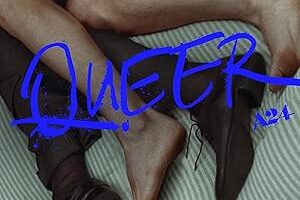Tropic Sprockets / The Royal Hotel
By Ian Brockway
Kitty Green (The Assistant) delivers a propulsive and engaging indictment of the virulent male in “The Royal Hotel.” While it is violent and noisy, the toxicity it illustrates is authentic, and it displays two strong females in a fight for survival. [Showtimes and trailer at TropicCinema.com.]
Hanna (Julia Garner) and Liv (Jessica Henwick) are two young Canadian adults seeking adventure. They agree to work at a bar in the remote Outback of Australia. At first, they are intrigued. Space and freedom await with little distraction. The opening shot of the hotel / bar tells a different story. All is dingy, empty and dark and there is no working shower.
After being very rudely shocked by the grizzled owner of the hotel Billy (Hugo Weaving), the pair start their first night at the bar. The execrable C-word spreads from male mouth like so much poisonous confetti, angry and depressing. Hanna winces with every percussive consonant but resolves to ignore it.
A huge uproar ensues. Drunk patrons are exposing themselves. A female patron flashes the men around the bar to applause and catcalls. Cacophony rules over all.
Despite the disorder, Liv and Hanna just wish to forget it, yet several leering men encircle the bar when Hanna begins her shift. A tall man named Teeth (James Frecheville) tells Hanna a string of blunt misogynist jokes.
Then a spaced out and angry regular Dolly (Daniel Henshall) fixates on both of the women. He is sneering and dismissive. During a patron’s celebration of an anniversary, he becomes violent. Hanna tries to tell Billy, but the owner is often too intoxicated to communicate. Hanna further voices her concern to Liv, but she only urges tolerance for at least two weeks.
A night later, on Liv’s birthday which feels like “Carrie” mixed with “The Road Warrior,” Liv is assaulted in the midst of male roars and jubilation. The bar becomes a tableau of male entitlement and machismo executed with the photographic horror of Hieronymus Bosch.
Hanna realizes in terror that she is surrounded by base and savage men who don’t wish her well.
While the film borrows a bit from Sam Peckinpah’s “Straw Dogs” (1971) and Robin Hardy’s “The Wicker Man” (1973), it engages the audience with its female strength and its uncompromising just deserts. Here in the Outback, there is a fetid virus, and it is spread by the cancerous hookworm of the C-word.
Write Ian at [email protected]
[livemarket market_name="KONK Life LiveMarket" limit=3 category=“” show_signup=0 show_more=0]





No Comment